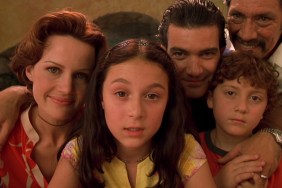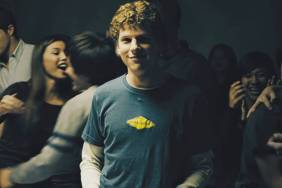
Take a look at the picture above. What do you see? If you’re screenwriter Aaron Sorkin or director David Fincher, you see a very clear way to begin your film The Social Network, based on the story of the development of social media behemoth Facebook. You see a way to provide an understandable motivation for your main character, Mark Zuckerberg, an event that will carry your film through to its ending. If you’re the living, breathing co-founder, chairman, and CEO of Facebook the film centers on, however, you might see something else entirely. “[The filmmakers] just kind of made up a bunch of stuff that I found really hurtful,” Zuckerberg told reporters in a public Q&A last week. “They made up this whole plot line about how I somehow decided to create Facebook to attract girls.” In the film’s opening scene, Zuckerberg (Jesse Eisenberg) is dumped and walked-out-on by then-girlfriend Erica Albright (Rooney Mara), prompting him to get back at her and ultimately try to win her and other girls over by creating his now multibillion-dollar company. As Zuckerberg tells it, though, he was already dating his now-wife Priscilla at the time the film’s events took place, a fact that would have made the movie at least a little less cinematic given the way the first scene plays out, with Eisenberg and Mara trading vicious Sorkin-isms and breathing intense drama into the scene, providing the movie’s version of Zuckerberg a motivation for his impending actions. In other words, the idea he created Facebook in order to get back at and/or win over an ex-girlfriend? Not true, says Zuckerberg. Since the 2010 release of the film, issues as to its depiction of events has arisen several times, from the motivation for the film’s main character to the extent in which Zuckerberg screwed over his co-founders, if at all. Perhaps the confusion comes from Sorkin himself, who famously told New York Magazine in September 2010, “I don’t want my fidelity to be to the truth; I want it to be to storytelling,” but then had this to say on the subject in the Harvard Crimson the following week:
“Attention to truth and attention to detail were incredibly important to us. When the truth was absolute and the truth was known, we gave you the truth. … [The film] is absolutely non-fiction. There were two lawsuits filed against Facebook at roughly the same time. What emerged were three very different versions of the story. Instead of picking one and deciding that’s the truth, I liked that there were three different versions of the truth. It is non-fiction about facts that are in dispute. The movie doesn’t take a position on what the truth is.”
So yeah, even Sorkin doesn’t seem clear about his intentions, or how accurately he and Fincher depicted the events of The Social Network. Given the way the film ends, however, I’m inclined to say Sorkin in fact does take a position on what the truth is. The final frames of the movie fit squarely into the narrative he creates in the first scene, which tells me his assumption is the motivation he gives Zuckerberg is an honest one. When Sorkin says his fidelity isn’t to the truth, but to storytelling, he seemingly gives himself a bit of an out, and so I’m led to believe he has no problem making events better fit the story he wants to tell, which isn’t wrong in and of itself. After all, he is a great storyteller, and even the term “non-fiction” doesn’t trade on accuracy alone. According to Wikipedia, the be-all and end-all of internet research, non-fiction is:
“[A] story based on real life facts and information. Non-fiction is a narrative, account, or other communicative work whose assertions and descriptions are believed by the author to be factual. These assertions and descriptions may or may not be accurate, and can give either a true or a false account of the subject in question; however, it is generally assumed that authors of such accounts believe them to be truthful at the time of their composition or, at least, pose them to their audience as historically or empirically true.“
I think the important piece of the passage above is what you see bolded, namely the assertions and descriptions that make something non-fiction “may or may not be accurate,” but also the authors either believe these assertions to be true or, at minimum, “pose them to their audience as historically or empirically true.” When Sorkin claims The Social Network is “absolutely non-fiction,” he thus implies the film is based on real life information he finds factual and poses as truth to his audience. Seeing as Sorkin was dealing with varied and murky accounts of the truth, a certain amount of artistic liberties had to be taken with the story. However, the issue for many is arguably Sorkin claiming his fidelity is to storytelling and not the truth, while in saying the film is non-fiction he implies his fidelity is to the truth and not necessarily storytelling. The important thing to keep in mind, though, is no film based on a true story is ever the whole truth. Instead, it is simply one piece of the story told from one specific point of view, a version of the truth that is biased in one way or another. Any film based on a true story will take certain liberties with the events that comprise it. Take The King’s Speech, for instance, or Fruitvale Station, or The Imitation Game, or any number of other “based on a true story” films you’ve seen. Each of these rests on a spectrum of truth, some “more truthful” or “less truthful” than others, but none of them are unequivocally “the Truth” with a capital “T.” The onus, then, is on all of us in this situation. First, it is on the filmmakers to appropriately present the truthfulness of their film, to acknowledge certain liberties were taken, certain characters written out of the story or combined into one, certain events made up or ignored, and so on. Don’t trumpet a film as the absolute truth when, in reality, it could never aspire to achieve that level of honesty. As a professor of mine tells our class each day, “Never use always, and never say never.” But the audience also bears responsibility here. In my field — accounting — we have a term called “professional skepticism.” It implies that, in all affairs, we are not to simply take things at face value, no matter how convincing the evidence may be. It is an attitude requiring a questioning mind and a curiosity to examine all the facts before coming to a conclusion or opinion. Thus, as audience members, we too should remain skeptical; we should not take everything we see on-screen as the truth, even if it is claimed as such. Too often we seem to rely on movies to provide us history lessons, and though movies are a very powerful medium, such behavior is just plain lazy. So yes, sure, Mark Zuckerberg finds The Social Network hurtful because of the way it depicts him and his motivations for creating Facebook, and his feelings are completely valid. It’s understandable for him to feel wronged. Perhaps, though, the larger problem isn’t Aaron Sorkin considering the film to be the truth, but the majority of the audience believing so as well, and for that, we should probably be a little embarrassed.









